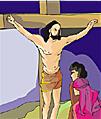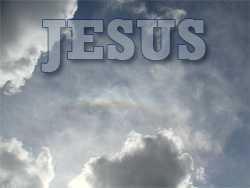|
BACKGROUND
THE FEASTS
EASTON
FEAST; FESTIVALS - RELIGIOUS; ATONEMENT; ATONEMENT, DAY OF; AZAZEL; PASSOVER; PENTECOST; TABERNACLES, FEAST OF:
NEW BIBLE DICTIONARY
PASSOVER; PENTECOST, FEAST OF; TABERNACLES, FEAST OF:
The
full background to this teaching is available online at this link
THE FEASTS - BIBLE DICTIONARIES
|
Online links to scriptures (New International Version [NIV] unless otherwise stated) are shown in blue
| BEYOND THE VEIL – 2
NEW TESTAMENT REVELATION ON ATONEMENT
THE BOOK OF HEBREWS (2nd of 2) |
|
See last week's teaching for the first section of Hebrews, points 1-3.
|
| 4. A Final Plea for Perseverance in the Faith: <i>(Hebrews 11:1-12:29)</i> |
|
 a. Perseverance by Faith: (11:1-40) a. Perseverance by Faith: (11:1-40)
“Now faith is being sure of what we hope for and certain of what we do not see. This is what the ancients were commended for.†(11:1-2)
Numerous examples of the forefathers’ faith from Abel to Rahab are testified to. Yet their well-earned reward will only be received along with ours.
“These were all commended for their faith, yet none of them received what had been promised. God had planned something better for us so that only together with us would they be made perfect.†(11:40)
|
|
|
 b. God Disciplines His Sons: (12:1-13) b. God Disciplines His Sons: (12:1-13)
Following the example of the ancient believers we are to persevere in our race,
“Let us fix our eyes upon Jesus, the author and perfecter of our faith, who for the joy set before him endured the cross, scorning its shame, and sat down at the right hand of the throne of God.†(12:2)
enduring the hardship of God’s disciplining of us as sons.
“Our fathers disciplined us for a little while as they thought best; but God disciplines us for our good, that we may share in his holiness. No discipline seems pleasant at the time, but painful. Later on, however, it produces a harvest
of righteousness and peace for those who have been trained by it.†(12:10-11)
|
|
|
 c. Warning Against Refusing God: (12:14-28) c. Warning Against Refusing God: (12:14-28)
Peacefulness and holiness is required of us.
“Make every effort to live in peace with all men and to be holy; without holiness no one will see the Lord.†(12:14)
We are to receive a heavenly kingdom, but that comes with responsibilities.
“Therefore, since we are receiving a kingdom that cannot be shaken, let us be thankful, and so worship God acceptably with reverence and awe, for our God is a consuming fire.†(12:28-29)
Hebrews 11:1-12:29
|
| 5. Concluding Exhortations: <i>(Hebrews 13:1-25)</i> |
|
 a. Practical rules for Christian Living: (13:1-17) a. Practical rules for Christian Living: (13:1-17)
A list of practical guidelines relating to hospitality, prisoners, marriage, love of money, leadership, strange doctrines, food, and submission, remembering that
“Jesus Christ is the same yesterday and today and forever.†(13:8)
|
|
|
 b. Personal Matters: (13:18-25) b. Personal Matters: (13:18-25)
Even here, an exhortation to go on to maturity and not fall away, the twin themes of this letter.
“Brothers, I urge you to bear with my word of exhortation, for I have written you only a short letter.†(13:22)
Hebrews 13:1-25
|
| A NOTABLE DIFERENCE BETWEEN OLD AND NEW |
|
 The Placing of the Golden Altar of Incense in the Most Holy Place: (9:3-4) The Placing of the Golden Altar of Incense in the Most Holy Place: (9:3-4)
This repositioning of the Golden Altar points to the supreme place of intercession, prayer, praise and worship as being the way to enter into the presence of God. This obvious difference and its interpretation are well recognised by most commentators. However it is only now starting to be seriously recognised and embraced by the church. The Tabernacle church movement will fully embrace it.
|
| STILL TODAY’S TWIN THEMES |
|
|
| 1. ACCENTUATING THE POSITIVE |
|
 God’s heart cry is the same today as it has always been – for His people to move on towards maturity, to become one with Jesus, to do the will of the Father through the leading and guiding of the Holy Spirit. Not just to hang on to our salvation by the skin of our teeth! God’s heart cry is the same today as it has always been – for His people to move on towards maturity, to become one with Jesus, to do the will of the Father through the leading and guiding of the Holy Spirit. Not just to hang on to our salvation by the skin of our teeth!
|
| 2. ELIMINATING THE NEGATIVE |
|
 The dire consequences of deliberately turning our backs on God are no less applicable today than they were in early New Testament times. While there is provision for the backslider to return to the Lord upon seeking the Lord’s forgiveness, there is only the certainty of terrible judgement upon the one who continually rejects the Lord, having once known Him. The correct theological term for such an action is ‘apostasy’. The dire consequences of deliberately turning our backs on God are no less applicable today than they were in early New Testament times. While there is provision for the backslider to return to the Lord upon seeking the Lord’s forgiveness, there is only the certainty of terrible judgement upon the one who continually rejects the Lord, having once known Him. The correct theological term for such an action is ‘apostasy’.
|
| 3. EXAMPLES IN THE NATURAL |
|
 King David had a heart after God even though his family was a mess and he committed both adultery and murder. But by throwing himself upon God’s mercy for his mistakes, he was forgiven, growing in maturity to be rewarded with the occupation of the Promised Land. His predecessor King Saul, on the other hand, continued to deliberately disobey God until he was finally condemned and rejected. These then, are natural examples of the spiritual principles so heavily emphasised in Hebrews. The same principles still apply today. King David had a heart after God even though his family was a mess and he committed both adultery and murder. But by throwing himself upon God’s mercy for his mistakes, he was forgiven, growing in maturity to be rewarded with the occupation of the Promised Land. His predecessor King Saul, on the other hand, continued to deliberately disobey God until he was finally condemned and rejected. These then, are natural examples of the spiritual principles so heavily emphasised in Hebrews. The same principles still apply today.
|
| THE HEART OF THE QUESTION IS OUR HEART! |
|
 Trying to avoid a theological discussion, but still no doubt getting myself into hot water, there are primarily two schools of thought regarding the relationship between our sin, and God’s grace in the forgiveness of it. Both are justified with supporting scriptures, but only one, in my opinion, reflects the true intent of scripture as a whole. Trying to avoid a theological discussion, but still no doubt getting myself into hot water, there are primarily two schools of thought regarding the relationship between our sin, and God’s grace in the forgiveness of it. Both are justified with supporting scriptures, but only one, in my opinion, reflects the true intent of scripture as a whole.
We have mentioned previously the important principle of the New Testament fulfilling the truths contained in the Old. Therefore to correctly interpret the New, an understanding of the Old is vital. The lack of such an understanding has led to the New being misinterpreted by many in the modern church.
The two differing approaches taken towards the forgiveness of sin are:
|
|
|
 1. Easy Christianity: Or the ‘Father Christmas’ approach! (Obviously the one I disagree with!) In this school of thought you can become a Christian by basically living how you like, provided you repent of your wrongdoings at regular intervals. God’s grace is all sufficient and unconditionally ever available. Once saved, always saved. The Doctrine of Grace through the death of Jesus overrides all else. No matter what you do, once having been ‘saved’, you are okay now and for eternity, no matter how you live. Now I know this is stating the case in its extreme form, but sadly, these principles form the basis of much of the teaching of the church. Sin is tolerated, often even acceptable. How sad it is to see so many good people misled. 1. Easy Christianity: Or the ‘Father Christmas’ approach! (Obviously the one I disagree with!) In this school of thought you can become a Christian by basically living how you like, provided you repent of your wrongdoings at regular intervals. God’s grace is all sufficient and unconditionally ever available. Once saved, always saved. The Doctrine of Grace through the death of Jesus overrides all else. No matter what you do, once having been ‘saved’, you are okay now and for eternity, no matter how you live. Now I know this is stating the case in its extreme form, but sadly, these principles form the basis of much of the teaching of the church. Sin is tolerated, often even acceptable. How sad it is to see so many good people misled.
|
|
|
 2. Walking With Jesus: The overriding theme of the Bible is one of mankind’s ongoing walk with his Creator. Sometimes we walk in obedience resulting in victory, at other times, in disobedience, resulting in failure. Success was, is, and always will be restored by true repentance. True repentance involves not only seeking forgiveness for a wrongdoing, but also, and most importantly, undertaking to the best of our ability, not to make the same mistake again. Can you see the difference? The last sentence does not end at ‘seeking forgiveness for wrongdoing’, but includes a commitment to pick ourselves up and to start walking again on the path of righteousness. To walk with Jesus. To walk as He walked. Of course, it can be a slippery path, one from which we often fall off, but He is there to lift us back on, if our desire is firmly resolved to walk on again with Him. For the reality is that we have been saved, we are being saved, and we will be saved, as we continue to walk along life’s path with our Saviour and Lord. Constantly being changed from glory unto glory. 2. Walking With Jesus: The overriding theme of the Bible is one of mankind’s ongoing walk with his Creator. Sometimes we walk in obedience resulting in victory, at other times, in disobedience, resulting in failure. Success was, is, and always will be restored by true repentance. True repentance involves not only seeking forgiveness for a wrongdoing, but also, and most importantly, undertaking to the best of our ability, not to make the same mistake again. Can you see the difference? The last sentence does not end at ‘seeking forgiveness for wrongdoing’, but includes a commitment to pick ourselves up and to start walking again on the path of righteousness. To walk with Jesus. To walk as He walked. Of course, it can be a slippery path, one from which we often fall off, but He is there to lift us back on, if our desire is firmly resolved to walk on again with Him. For the reality is that we have been saved, we are being saved, and we will be saved, as we continue to walk along life’s path with our Saviour and Lord. Constantly being changed from glory unto glory.
Walking in deliberate disobedience, to be easily repented of at our convenience, is not the true teaching of the Bible.
|
| THE VITAL IMPORTANCE OF ATONEMENT (CLEANSING) TO TODAY’S CHURCH |
|
 The ultimate key to entering into the presence of God is found through repentance. For darkness cannot co-exist with the light. Sin and God are simply incompatible. Every revival, from the Book of Acts right through into the 21st Century, has been based upon the foundation of repentance to bring about cleansing. The ultimate key to entering into the presence of God is found through repentance. For darkness cannot co-exist with the light. Sin and God are simply incompatible. Every revival, from the Book of Acts right through into the 21st Century, has been based upon the foundation of repentance to bring about cleansing.
The Day of Atonement was “The annual day of humiliation and expiation (i.e. making amends) for the sins of the nation.†(Davis Dictionary of the Bible, page 65) While this was done by the High Priest through sacrifices on behalf of the people, the people themselves were to be committed to this cleansing process in the only compulsory fast of the year.
Jesus, of course was and is the one time New Testament atonement or sacrifice for us today. In turn we are to be committed to a cleansing process in our lives too. This feast of cleansing preceded the glorious Feast of Tabernacles, and was a prerequisite for it. Similarly, without cleansing of lives today, there will be no fulfilment of the promised glory of the Church in end times, as has been foretold in the pattern of the Feast of Tabernacles. It is of no use praying for the power to perform miracles and healings, without first being prepared to humble oneself in repentance before our God. To submit to the changes He desires to make in our life, however painful they may be.
We are expected to act out what we believe. Words without actions are meaningless. That is the simple message of the Old Testament Day of Atonement, endorsed and confirmed in the New. God cannot live with sin. We cannot enter into His presence with sin in our lives. The choice is simple. God or sin! The choice is ours.
|
| <i>NEXT WEEK</i> |
|
 Finally, we have arrived at the largest, most joyous Feast in the Jewish Religious Year. It has taken a long time to get here, but then the Jews also had to live through a long, hot summer before this time of great celebration. Finally, we have arrived at the largest, most joyous Feast in the Jewish Religious Year. It has taken a long time to get here, but then the Jews also had to live through a long, hot summer before this time of great celebration.
Over the next 2 weeks, let's see what it meant for them - and for us.
|
| A NOTE FROM DAVID |
|
 The reality of Jesus is to be seen to be a reality in our lives too. He lived a life of sacrifice and we are to as well. The reality of Jesus is to be seen to be a reality in our lives too. He lived a life of sacrifice and we are to as well.
Today's picture is of the view from one of the many walking tracks through our amazing New Zealand scenery.
Nelson Lakes: Lake Rotoiti, Lake Head Track
|
So until next week.......
MAY GOD BLESS YOU AND YOU BLESS GOD!
His servant and yours

Learn more about us at...
www.wwj.org.nz/about.php
|
A DAVID'S DOODLING
9. The foolish man is satisfied with reading the Word, a wise man follows the Word, but the godly man is as one with the Word.
David Tait
|
Check
out the WWJ website for….
More David's Doodlings: www.wwj.org.nz/dd.php
Life's a Laugh: http://www.wwj.org.nz/lifelaugh.php
Links to other sites of interest: http://www.wwj.org.nz/links.php
Till Death do us Part!: http://www.wwj.org.nz/tddup.php
Pets Rule!: http://www.wwj.org.nz/pets.php
|

 a. Perseverance by Faith: (11:1-40)
a. Perseverance by Faith: (11:1-40) b. God Disciplines His Sons: (12:1-13)
b. God Disciplines His Sons: (12:1-13) c. Warning Against Refusing God: (12:14-28)
c. Warning Against Refusing God: (12:14-28) a. Practical rules for Christian Living: (13:1-17)
a. Practical rules for Christian Living: (13:1-17) b. Personal Matters: (13:18-25)
b. Personal Matters: (13:18-25) The Placing of the Golden Altar of Incense in the Most Holy Place: (9:3-4)
The Placing of the Golden Altar of Incense in the Most Holy Place: (9:3-4) God’s heart cry is the same today as it has always been – for His people to move on towards maturity, to become one with Jesus, to do the will of the Father through the leading and guiding of the Holy Spirit. Not just to hang on to our salvation by the skin of our teeth!
God’s heart cry is the same today as it has always been – for His people to move on towards maturity, to become one with Jesus, to do the will of the Father through the leading and guiding of the Holy Spirit. Not just to hang on to our salvation by the skin of our teeth!  The dire consequences of deliberately turning our backs on God are no less applicable today than they were in early New Testament times. While there is provision for the backslider to return to the Lord upon seeking the Lord’s forgiveness, there is only the certainty of terrible judgement upon the one who continually rejects the Lord, having once known Him. The correct theological term for such an action is ‘apostasy’.
The dire consequences of deliberately turning our backs on God are no less applicable today than they were in early New Testament times. While there is provision for the backslider to return to the Lord upon seeking the Lord’s forgiveness, there is only the certainty of terrible judgement upon the one who continually rejects the Lord, having once known Him. The correct theological term for such an action is ‘apostasy’.  King David had a heart after God even though his family was a mess and he committed both adultery and murder. But by throwing himself upon God’s mercy for his mistakes, he was forgiven, growing in maturity to be rewarded with the occupation of the Promised Land. His predecessor King Saul, on the other hand, continued to deliberately disobey God until he was finally condemned and rejected. These then, are natural examples of the spiritual principles so heavily emphasised in Hebrews. The same principles still apply today.
King David had a heart after God even though his family was a mess and he committed both adultery and murder. But by throwing himself upon God’s mercy for his mistakes, he was forgiven, growing in maturity to be rewarded with the occupation of the Promised Land. His predecessor King Saul, on the other hand, continued to deliberately disobey God until he was finally condemned and rejected. These then, are natural examples of the spiritual principles so heavily emphasised in Hebrews. The same principles still apply today.  Trying to avoid a theological discussion, but still no doubt getting myself into hot water, there are primarily two schools of thought regarding the relationship between our sin, and God’s grace in the forgiveness of it. Both are justified with supporting scriptures, but only one, in my opinion, reflects the true intent of scripture as a whole.
Trying to avoid a theological discussion, but still no doubt getting myself into hot water, there are primarily two schools of thought regarding the relationship between our sin, and God’s grace in the forgiveness of it. Both are justified with supporting scriptures, but only one, in my opinion, reflects the true intent of scripture as a whole.  1. Easy Christianity: Or the ‘Father Christmas’ approach! (Obviously the one I disagree with!) In this school of thought you can become a Christian by basically living how you like, provided you repent of your wrongdoings at regular intervals. God’s grace is all sufficient and unconditionally ever available. Once saved, always saved. The Doctrine of Grace through the death of Jesus overrides all else. No matter what you do, once having been ‘saved’, you are okay now and for eternity, no matter how you live. Now I know this is stating the case in its extreme form, but sadly, these principles form the basis of much of the teaching of the church. Sin is tolerated, often even acceptable. How sad it is to see so many good people misled.
1. Easy Christianity: Or the ‘Father Christmas’ approach! (Obviously the one I disagree with!) In this school of thought you can become a Christian by basically living how you like, provided you repent of your wrongdoings at regular intervals. God’s grace is all sufficient and unconditionally ever available. Once saved, always saved. The Doctrine of Grace through the death of Jesus overrides all else. No matter what you do, once having been ‘saved’, you are okay now and for eternity, no matter how you live. Now I know this is stating the case in its extreme form, but sadly, these principles form the basis of much of the teaching of the church. Sin is tolerated, often even acceptable. How sad it is to see so many good people misled.  2. Walking With Jesus: The overriding theme of the Bible is one of mankind’s ongoing walk with his Creator. Sometimes we walk in obedience resulting in victory, at other times, in disobedience, resulting in failure. Success was, is, and always will be restored by true repentance. True repentance involves not only seeking forgiveness for a wrongdoing, but also, and most importantly, undertaking to the best of our ability, not to make the same mistake again. Can you see the difference? The last sentence does not end at ‘seeking forgiveness for wrongdoing’, but includes a commitment to pick ourselves up and to start walking again on the path of righteousness. To walk with Jesus. To walk as He walked. Of course, it can be a slippery path, one from which we often fall off, but He is there to lift us back on, if our desire is firmly resolved to walk on again with Him. For the reality is that we have been saved, we are being saved, and we will be saved, as we continue to walk along life’s path with our Saviour and Lord. Constantly being changed from glory unto glory.
2. Walking With Jesus: The overriding theme of the Bible is one of mankind’s ongoing walk with his Creator. Sometimes we walk in obedience resulting in victory, at other times, in disobedience, resulting in failure. Success was, is, and always will be restored by true repentance. True repentance involves not only seeking forgiveness for a wrongdoing, but also, and most importantly, undertaking to the best of our ability, not to make the same mistake again. Can you see the difference? The last sentence does not end at ‘seeking forgiveness for wrongdoing’, but includes a commitment to pick ourselves up and to start walking again on the path of righteousness. To walk with Jesus. To walk as He walked. Of course, it can be a slippery path, one from which we often fall off, but He is there to lift us back on, if our desire is firmly resolved to walk on again with Him. For the reality is that we have been saved, we are being saved, and we will be saved, as we continue to walk along life’s path with our Saviour and Lord. Constantly being changed from glory unto glory.  The ultimate key to entering into the presence of God is found through repentance. For darkness cannot co-exist with the light. Sin and God are simply incompatible. Every revival, from the Book of Acts right through into the 21st Century, has been based upon the foundation of repentance to bring about cleansing.
The ultimate key to entering into the presence of God is found through repentance. For darkness cannot co-exist with the light. Sin and God are simply incompatible. Every revival, from the Book of Acts right through into the 21st Century, has been based upon the foundation of repentance to bring about cleansing.  Finally, we have arrived at the largest, most joyous Feast in the Jewish Religious Year. It has taken a long time to get here, but then the Jews also had to live through a long, hot summer before this time of great celebration.
Finally, we have arrived at the largest, most joyous Feast in the Jewish Religious Year. It has taken a long time to get here, but then the Jews also had to live through a long, hot summer before this time of great celebration. The reality of Jesus is to be seen to be a reality in our lives too. He lived a life of sacrifice and we are to as well.
The reality of Jesus is to be seen to be a reality in our lives too. He lived a life of sacrifice and we are to as well.